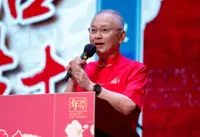KUALA LUMPUR: Malaysia must go beyond developing data centres and ramp up its digital capabilities to stay ahead in a fast-changing global economy, says MCA president Datuk Seri Dr Wee Ka Siong.
While the country’s data infrastructure is expanding rapidly, he said this growth must be matched with artificial intelligence (AI) development, content creation and the cultivation of local digital talent.
Follow us on our official WhatsApp channel for breaking news alerts and key updates!
Thank you for your report!





